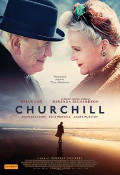
Directed by
Jonathan Teplitzky
105 minutes
Rated M
Reviewed by
Bernard Hemingway

Churchill
Synopsis: British Prime Minister Winston Churchill (Brian Cox) attempts to stop the planned invasion of Normandy during WWII which he feels will turn into a disaster as his long-suffering wife, Clementine (Miranda Richardson), forbears his ill-humoured petulance.
I have never been sure of Winston Churchill’s place in history. Like everyone I know of him as the paunchy, cigar-chomping, V-signing icon clad in black overcoat and homburg who helmed Great Britain through WWII. But I’ve always had the impression that his post-war career, particularly his 1951-55 second term as Prime Minister, was less than glorious. I’m none the wiser after having seen Australian director Jonathan Teplitzky’s film about the man. I say ‘film” because despite the title it is not so much a biopic as the dramatisation of the few days leading up to the Allied invasion of Normandy in Operation Overlord on 6 June, 1944 or as it is commonly known, D-Day, with a focus on Churchill’s role within it.
Churchill is portrayed not as a valiant leader of his people but rather as a tired, old man haunted by his experiences in WWI, in particular his involvement in Gallipoli, a disaster of which he is convinced that the Normandy invasion will be a repeat. His attempts to dissuade Britain’s General Montgomery (Julian Wadham) and America’s General Eisenhower (John Slattery) who by this time has assumed command of all Allied forces in Europe is regarded as a mixture of ill-informed interference and political grandstanding. As Churchill finds himself marginalized he begins consoling himself with the bottle and his steadfast wife Clemmie is the only thing keeping him from complete mental collapse.
Given that it is Churchill’s name that will attract most audience it is ironic that the film has suffered critically precisely because it deals with historical facts. Had it been a purely fictional creation like the currently-screening Their Finest it would be guiltlessly enjoyed as a period drama. But Alex von Tunzelmann’s script has apparently taken considerable liberty with the actuality of events, shifting Churchill’s opposition to the invasion of France from 1942 and 1943 to 1945 by which time in actuality he had become a fervent proponent of the plan.
As this pretty well undermines the veracity of what we see, for some audiences this undermines the film as such. Clearly it’s a valid point, more moral than aesthetic perhaps but no less significant for that. But this is not to gainsay Brian Cox’s brilliant performance which not only captures the physical presence of the man but also his prowess as a rhetorician as well as his rather gnarled humanity. Von Tunzelmann’s script may well play merry with the history books but it gives plenty of opportunity to Cox to embody these qualities. Teplitzky’s staging is strikingly simple and combines with cinematographer David Higgs crystal-clear imagery to bring us into close contact with the characters who often stand forth in close-up from uncluttered or out-of-focus backgrounds.
If there was one thing I could have done without it was the interpellation of a minor distraction involving Churchill‘s doe-eyed secretary (Ella Purnell) whilst the film’s hagiographic end titles which make a claim for Churchill as the “Greatest Briton of all time” (apparently based on a 2002 poll) seems ludicrously immoderate. Albeit so, whilst perhaps for the historically uninformed only Churchill is an enjoyable film that plays to the legend but not in a doting way.
FYI: A 2002 HBO movie The Gathering Storm with Albert Finney and Vanessa Redgrave focuses primarily on the relationship between Winston and Clemmie and is generally regarded as historically accurate.

Want more about this film?


Want something different?




